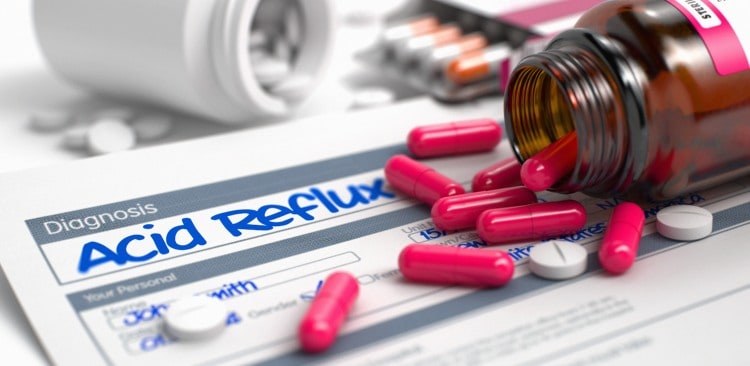Hong Kong Researchers Find Higher Risk Of Gastrointestinal Cancer In PPI Patients

Long-term proton pump inhibitor use has been associated with an increased risk for gastrointestinal cancer, according to a new study from researchers at the University of Hong Kong. Analyzing data from nearly 63,400 patients, the study’s authors found a 2.44 increased risk for gastric cancer among patients who had taken one of the popular heartburn medications.
New Study Finds Association Between PPI & Gastric Cancer
Nexium, Prilosec and Prevacid are the world’s most popular heartburn drugs. They also happen to be proton pump inhibitors (PPI), belonging to a class of medications that all reduce the amount of gastric acid in the stomach.
As a short-term treatment option, there’s no doubt that proton pump inhibitor drugs are effective in tackling the symptoms of gastroesophageal reflux disease (GERD), Zollinger-Ellison syndrome and other disorders linked to excessive gastric acid levels. Long-term use, however, has been associated with a host of severe side effects, including bone fractures and serious kidney disorders.
4,500+ PPI Lawsuits In Federal Court
Over 4,500 patients have filed personal injury lawsuits against key manufacturers of proton pump inhibitor drugs, including AstraZeneca and Takeda Pharmaceuticals.
Study: PPI Patients More Likely To Develop Gastric Cancer
A team from the University of Hong Kong have now added a new potential risk to the long roster of proton pump inhibitor side effects. In a paper published in the peer-reviewed medical journal Gut, Dr. K.S. Cheung and colleagues outline the intriguing results from their analysis of 63,397 patients.
Study Structure: PPI Drugs & H. Pylori Infections
The study was focused solely on patients who had been prescribed a proton pump inhibitor as part of their treatment for Helicobacter pylori infections.
Nexium, Prilosec, Prevacid, Dexilant and Zegerid are approved for use in treating the bacterial infection, which attacks stomach cells and renders the intestines more vulnerable to gastric acid.
Alongside clarithromycin, an antibiotic, proton pump inhibitors are often prescribed to infected individuals, helping to reduce the secretion of stomach acid and decreasing unpleasant symptoms. At the same time, researchers have long-understood that PPI drugs can lead to gastric atrophy, Dr. Cheung and his co-authors write, noting that this risk appears to be highest in patients who are treated for an H. pylori infection.
Gastric Atrophy
Gastric atrophy (or atrophic gastritis) is a chronic inflammatory disease that can kill off gland cells in the intestines. Dr. Cheung and his colleagues focused their research on this patient population due to the increased risk of gastric atrophy in H. pylori-infected patients.
The researchers excluded from their study patients who had not been effectively treated through the clarithromycin-based drug regimen, along with patients who had been diagnosed with gastric cancer or gastric ulcers within the first 12 months after receiving their treatment.
244% Increased Risk
Ultimately, a total of 63,397 patients were eligible for inclusion in the study. Out of this group, Dr. Cheung and his co-authors identified 153 patients who had been diagnosed with gastrointestinal cancer, receiving the diagnosis an average of 7.6 years after their exposure to proton pump inhibitors.
Using sophisticated statistical techniques, the team was able to calculate the risk of developing gastric cancer after receiving a PPI drug. Compared to members of the general public, PPI patients in the study were 2.44-times more likely to be diagnosed with gastric cancer.
Decreased Risk In H2-Antagonist Patients
A similar risk was not observed in patients who were prescribed histamine-2 receptor antagonists, or H2 antagonists, which served as the first generation of prescription heartburn drugs. Proton pump inhibitors were introduced to replace H2 antagonists, but according to Dr. Cheung and his co-authors, the newer line of drugs are linked to a far higher risk of gastrointestinal cancer.
In fact, patients who took an H2 antagonist were nearly 30% less likely than members of the general population to develop gastric cancer.
Risk Increased By Treatment Duration
In their report, the authors note an additional result that only serves to strengthen their conclusion. The risk of gastric cancer in PPI patients increased along with the duration of treatment. The longer a patient took a PPI drug, the more likely it became that they would develop gastric cancer, which is precisely what we would expect if proton pump inhibitors actually play a role in causing gastrointestinal cancer.
Link To Gastric Cancer “Should Have Been Realized Decades Ago”
These results are not particularly surprising, according to Norwegian researchers Dr. Helge Lyder Waldum and Dr. Reidar Fossmark. In a letter published by Gut, the two medical experts describe their long fight to convince the medical community that PPI drugs can cause gastrointestinal cancers.
Over the last three decades, Drs. Waldum and Fossmark have published over 200 papers and letters outlining the effect that proton pump inhibitors have on gastrin, a hormone that triggers the secretion of gastric acid.
Through 30 years of research, “we always have concluded that PPI treatment in the long term would cause gastric cancer,” the doctors write. Drs. Waldum and Fossmark consider the recent Gut study to be confirmation of their tireless research, but they express great concern that the risk was not acknowledged until now. Ending their letter, the researchers write, “we conclude that the carcinogenic effect by PPI treatment is due to hypergastrinemia, which should have been realized decades ago before exposing so many patients to a risk of a serious disease.”
Dr. Cheung’s paper, “Long-term proton pump inhibitors and risk of gastric cancer development after treatment for Helicobacter pylori: a population-based study,” was published online on October 31, 2017. It appeared in print in the January 2018 edition of Gut.
